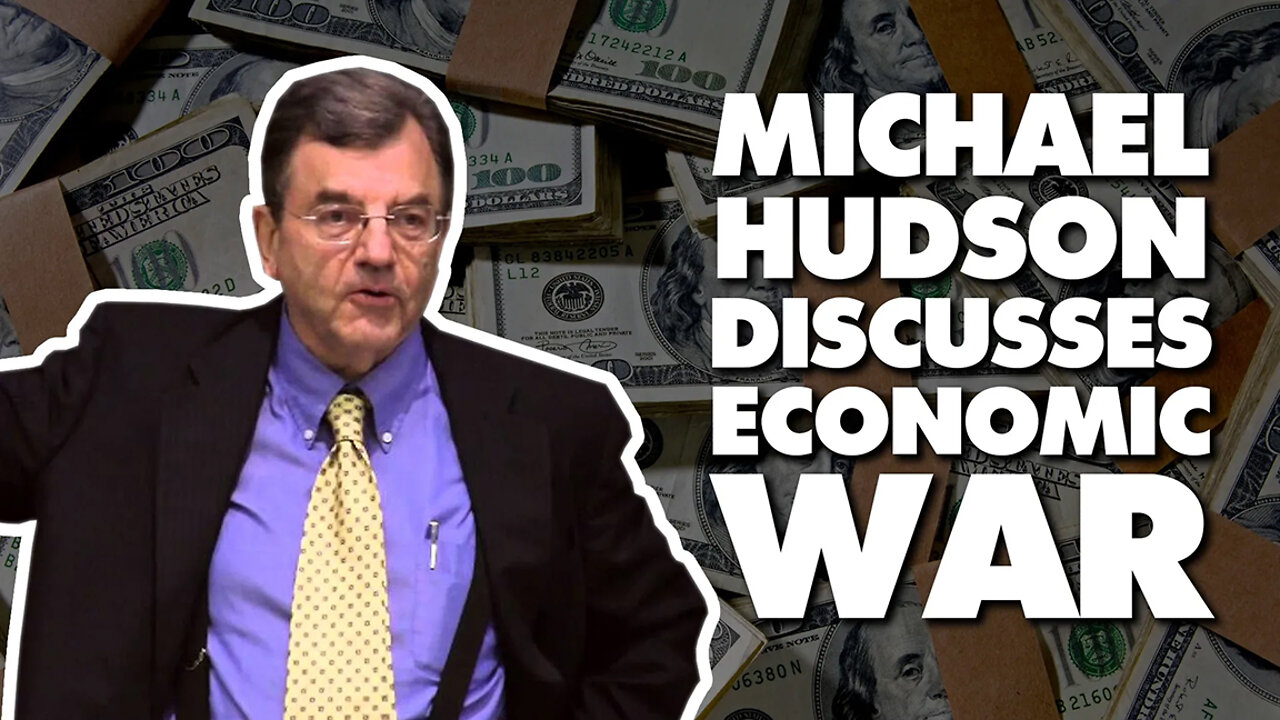Premium Only Content

Destiny of Civilization, Interview by Ben Norton
Destiny of Civilization, Interview by Ben Norton
May 13, 2022
Multipolarista
Economist Michael Hudson discusses the decline of the US dollar, the sanctions war on Russia, his concept of "free-trade imperialism," and financial parasitism. Michael Hudson, author of, Super Imperialism. The Economic Strategy of American Empire.
In this interview with Multipolarista editor Benjamin Norton, economist Michael Hudson discusses the decline of the US dollar, the sanctions war on Russia, his concept of "free-trade imperialism," and financial parasitism.
We talk about these concepts explored in his new book "The Destiny of Civilization: Finance Capitalism, Industrial Capitalism or Socialism."
In this interview with Multipolarista editor Benjamin Norton, economist Michael Hudson discusses the decline of the US dollar, the sanctions war on Russia, his concept of "free-trade imperialism," and financial parasitism.
We talk about these concepts explored in his new book "The Destiny of Civilization: Finance Capitalism, Industrial Capitalism or Socialism."
BENJAMIN NORTON: Hey, everyone. I'm Ben Norton, and this is the Multipolarista podcast. And I have the great pleasure of being joined today by one of my favorite guests, one of I think the most important economists in the world today. I'm speaking with Professor Michael Hudson.
If you've seen any of the interviews I've done with Professor Hudson over the past few years, you probably know that he's a brilliant analyst. He always has, I think, the best analysis to understand what's going on economically and also politically, geopolitically, in the world today.
And right now is, I think, a very important moment to have Professor Hudson on today. We're going to talk about the economic war on Russia and the process of economic decoupling between Russia and China and the West, which is something that Professor Hudson has talked about for many years. And that really has accelerated with the Western sanctions on Russia over Ukraine.
We're also going to talk about the decline in U.S. dollar hegemony. A recent report from the International Monetary Fund, which is dominated by the U.S., acknowledged that the use of the dollar in foreign bank reserves is gradually declining.
Now, it's not going to disappear overnight. But even the IMF is acknowledging that dollar hegemony is eroding. And, of course, the IMF acknowledged that the Western sanctions on Russia are going to further erode the hegemony of the U.S. dollar.
We now see Russia doing business with China in the Chinese yuan. Russia is also doing business with India with the Indian rupee. And of course Russia has been telling Europe that if it wants to buy Russian energy, it has to do so with Russian rubles.
So there's so much to talk about today, Professor Hudson, but I want to begin in the first half of this interview today talking about a new book that you're just about to publish.
Today is Monday, May 9th. You said on Wednesday, May 11th, the book comes out. And it's called "The Destiny of Civilization: Finance Capitalism, Industrial Capitalism or Socialism."
And everything that I just prefaced this interview with, discussing the economic war in Russia and sanctions and decoupling, this is all deeply related to what you talk about in this book. And I had the pleasure of getting an early copy and reading through it. It's a really important book, I think.
And you talk about this fundamental divide internationally – and this is a divide that actually goes back historically as well – between these three models for different economic systems you discuss: finance capitalism, industrial capitalism, and socialism.
And your argument is that the U.S. empire has been a force for imposing neoliberalism, which is a particular form of finance capitalism, which is nonproductive, in which finance capital destroys productive industries in pursuit of rent-seeking, and what you call the rentier class.
So instead of producing, as the classical bourgeois economists had said capitalism would be a productive system instead, finance capitalism is fundamentally a system of destruction and debt.
And your argument is that this is deeply rooted in U.S. foreign policy. This is the U.S. foreign policy strategy for expanding its economic power, is imposing this finance capitalist model on the world.
So can you expand further on your argument about the fight between finance capitalism, industrial capitalism, and socialism, and why you decided to publish this book now?
MICHAEL HUDSON: Well the book came out of a series of 10 lectures that I did for my Chinese audience. I've been a professor at Peking University for a number of years in economics, and have professorships at other universities, Wuhan and Hong Kong.
And I have a fairly large audience of about 65,000 people per lecture there. And I was asked to give my general overview, sort of a history of economic development in the West, for the Chinese.
And in order to understand today's finance capitalism, you have to understand what industrial capitalism was, as it was described in the 19th century.
And it's often forgotten, or played down, that industrial capitalism was revolutionary. What it was trying to do – from the physiocrats in France in the late 18th century to Adam Smith, John Stuart Mill, Marx, and the whole late-19th century flowering of socialism – the ideal of classical value theory and rent theory, was to say what is the actual value, the cost value of producing goods and services?
And what is earned by the capitalist, when he employs labor to make a profit, and what is unearned? And what is unearned was the landlord class. That was the hereditary warrior class that conquered all of the European kingdoms in the Middle Ages.
And the attempt by England's industrialists was saying, look, we cannot become the workshop of the world; we cannot undersell foreign countries if we have a landlord class ripping off all of the money in land rent.
And if we have predatory banking, or the wealthy people just lend really for buying property, or making distressed loans or predatory loans that have nothing to do with financing actual capital formation.
Well, what made this capitalism revolutionary was the British industrialists and advocates of industry, even the bankers in Ricardo's time, said, well, in order to overthrow the landlord class, which controls the House of Lords and all of the upper chambers of government in Europe, we have to have democratic reform.
If we have democratic reform and give voting to the people, they're going to vote against the landlord class, and then we can have an efficient economy where our prices of our exports and our goods and services reflect the actual cost of production, not the rake off for the rentiers class, not the rake off of what landlords take, not the rake off of what predatory bankers take.
And the whole long 19th century leading up to World War One was this revolutionary value theory that depicted land rent and monopoly rent and financial returns as being unearned income and wanting to strip it away.
And all of this seemed to be moving toward socialism. The industrialists were all in favor of government public utilities, of government enterprise, because they said, if the government doesn't provide health care, then individuals are going to have to pay it, and it'll cost a lot of money, like it does in the United States.
And so you had the conservative prime minister of England, Benjamin Disraeli, saying, health, all is health, we've got to provide public health for the people.
And it was the conservative Bismarck in Germany that said, we've got to provide pensions. If labor has to save up for the pensions, then it's not going to have enough money to buy the goods and services that we Germans are producing. We have got to make pensions public.
So all of this move towards socialism was not only in favor of increasing living standards, which soared in the 19th century, but also in freeing the economy from the rentier class, from the landlords, from the bankers.
And for the classical economists, a free market was a market free from landlords, free from bankers, free from monopolists.
Well, needless to say, the rentiers fought back. And by after World War Two, we've seen a continual anti-classical theory replacing the classical idea of free markets with a value of free theory, saying, well, everybody earns whatever they they have. All wealth is earned, not unearned. And if Goldman Sachs partners are paid more than anyone else, that's because they're so productive.
So you had a move rejecting classical economics, a junk economics, and a kind of artificial economics that doesn't really talk about how finance capitalism has worked.
And as it turns out, the business plan of finance capitalism was so predatory that it was anti-industrial.
That's why President Clinton in the United States moved to invite China into the International Labor Organization, saying, well, we can fight wage rises in America by a race to the bottom. We can we can hire Asians to do work, and that will cause unemployment here. And that's wonderful for the industrialists. It will basically cut wages and keep American wages down.
Well, that basically is the strategy of finance capitalism, and the aim of finance capitalism is not to invest in factories, and plant equipment, and research and development, but to live in the short term, but to make money by financial engineering, not industrial engineering.
And it becomes predatory, and so you have the whole ideological attack on public enterprise. You have Frederick Hayek's "The Road to Serfdom," where you say, if government provides public healthcare, that's "the road to serfdom," where actually it's finance capitalism that is the road to debt peonage and serfdom.
And you have now a whole disparagement of government. And all of this is a counter-revolution to the revolutionary impetus of industrial capitalism in its early stages.
And it's true that corporations now are just as right-wing as the the banks and the hedge funds. But that's because corporate industry has been taken over by the financial sector, and the heads of almost every industrial corporation are rewarded the how high they can push the stock price, to exercise the stock options they're paid in.
And you increase the stock price not by investing more, not by hiring more labor or increasing productivity or increasing sales, but simply by using whatever income you have to buy back your stocks. And by buying back your stocks, this forces up their price.
And, most of all, by giving political contributions in this country to the Democrats and Republicans alike, who appoint Federal Reserve heads that have spent $7-9 trillion buying up stocks and bonds to increase the price of buying a retirement income, to increase Wall Street prices, to increase housing prices, and make America even less competitive industrially.
So finance capitalism is what has essentially de-industrialized the United States and turned the Midwest into a Rust Belt.
READ MORE: https://www.unz.com/mhudson/destiny-of-civilization-interview-by-ben-norton/
=
Please support Multipolarista at https://multipolarista.com/support
Patreon: https://www.patreon.com/multipolarista
Podcast: https://soundcloud.com/multipolarista
Telegram: https://t.me/multipolarista
-
 LIVE
LIVE
Candace Show Podcast
49 minutes agoEXCLUSIVE! Brigitte Macron's Lawyer Has A Dark Past. Dan Bongino Speaks Out. | Candace Ep 220
2,673 watching -
 1:18:11
1:18:11
Redacted News
37 minutes agoScotland is being DESTROYED and Neil Oliver is trying to save it
3 -
 1:11:04
1:11:04
vivafrei
2 hours agoWhat Did Bongino See? The Epstein "Privilege"! Canada Has Become a Dangerous JOKE & MORE!
16.9K38 -
 2:07:48
2:07:48
The Quartering
4 hours agoToday's Breaking News With Josie The Red Headed Libertarian, Hannah Claire & Luke Rodkowski
92.4K22 -
 LIVE
LIVE
Akademiks
3 hours agoDrake Tries for another #1?? Kodak vs YB still? Ksoo gets snitched on. Doechii plz stop botting
1,153 watching -
 LIVE
LIVE
The HotSeat
58 minutes agoHate Crimes In Cincy + Hiring A White Girl Makes You A NAZI?!?!
644 watching -
 25:24
25:24
Stephen Gardner
1 hour ago🔥 RFK Just SHUT DOWN a DISTURBING Problem!
2965 -
 LIVE
LIVE
Film Threat
6 hours agoVERSUS: SUPERMAN VS. THE FANTASTIC FOUR | Film Threat Versus
127 watching -
![[Ep 715] The Trump Way: Deals & Peace | Hate Crimes – Brutal Beat Downs | CA Homeless Money Scam](https://1a-1791.com/video/fww1/f5/s8/1/6/3/j/6/63j6y.0kob-small-Ep-715-The-Trump-Way-Deals-.jpg) LIVE
LIVE
The Nunn Report - w/ Dan Nunn
1 hour ago[Ep 715] The Trump Way: Deals & Peace | Hate Crimes – Brutal Beat Downs | CA Homeless Money Scam
240 watching -
 2:36:55
2:36:55
Nerdrotic
6 hours ago $0.41 earnedCancel Kurtzman Trek | The Fate of the Superhero Film - Nerdrotic Nooner 502
31.9K2